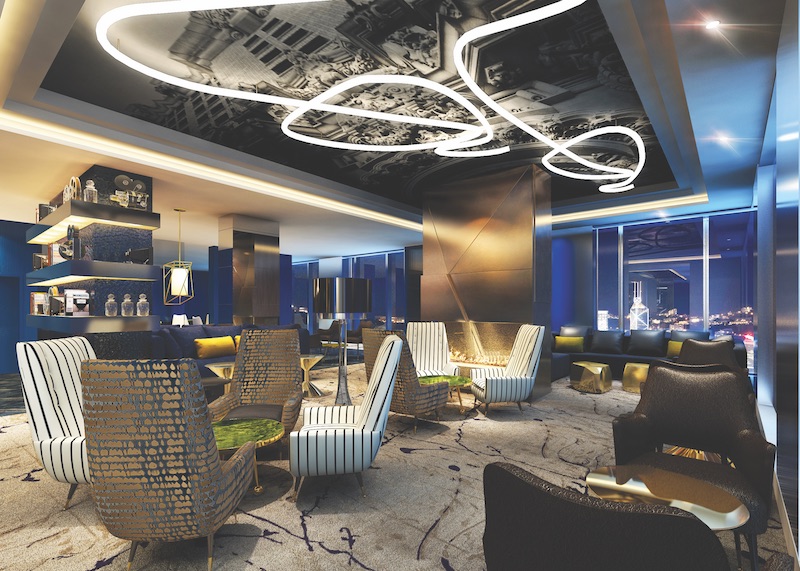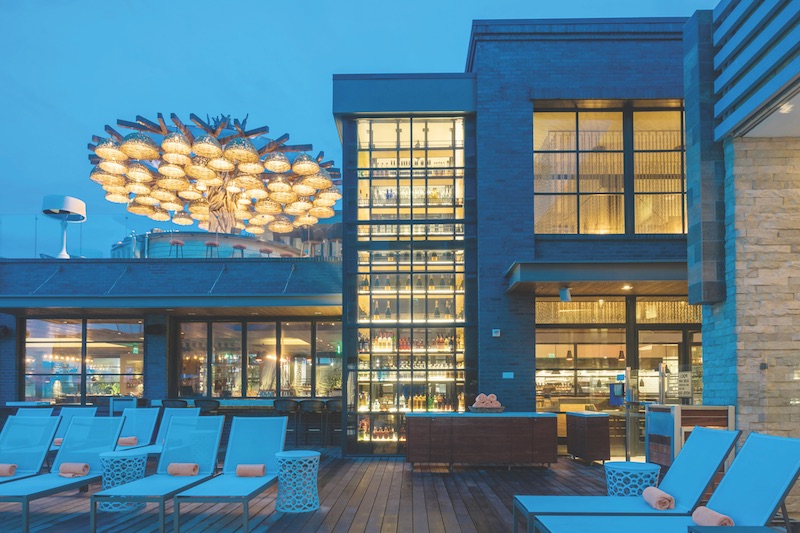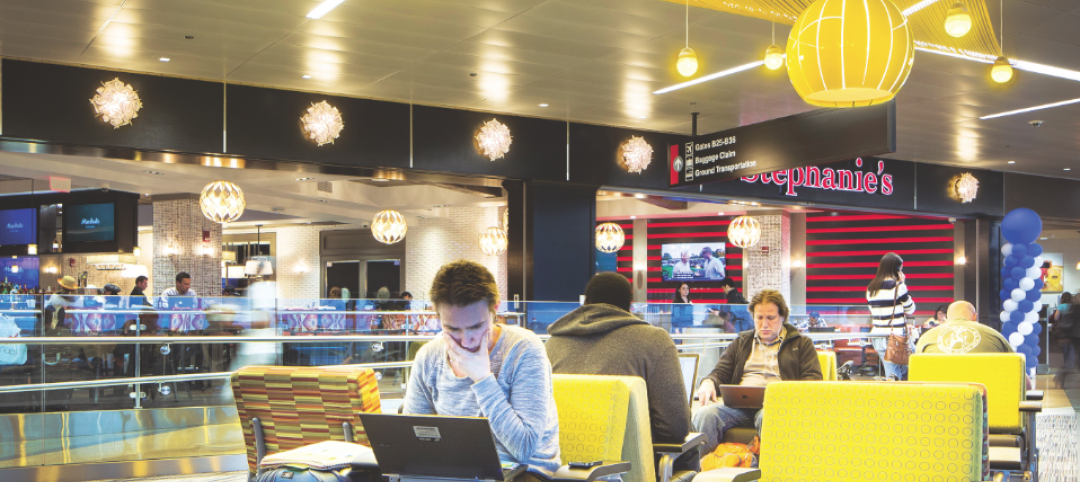Then describing how his FIRM’S design of the 111-room Strand & Pier Hotel, in the heart of Hermosa Beach, Calif., will capture the essence of that famous surfing town, Don Harrier, AIA, LEED AP, Principal with HKS, waxes nostalgic.
The 12x40-foot guestroom dimensions reflect “longboard proportions,” he says. Finely detailed wood rails, trellises, and partitions “evoke the handcrafted nature of shaping surfboards.” Hermosa Beach was also once a hotspot for jazz, and the hotel’s broken-up massing “takes its cues from jazz notions of syncopated rhythms.”
All this might sound like architectese were it not that Harrier’s comparisons fit nicely into one of the trends influencing hotel construction and renovation: bringing local culture and cuisine as close as possible to the guest experience.
“There is a huge emphasis on local design connections and regional design touches,” says Robert Fischel, AIA, LEED AP, Principal and Hospitality Practice Area Leader with Gensler.
Creating social hubs
Because hotels can take as long as six years to complete, spotting trends—and differentiating them from fads—is tough when tastes and systems change so rapidly.
Before it commences a hotel’s design, WATG and Wimberly Interiors conducts in-depth market research to understand who the end users are going to be. Chinese travelers, for example, prefer group travel, shorter lengths of stay, and higher spending on retail and activities.
There is an increased focus on a return to “the simple life,” say Rob Sykes, Senior Associate, and Ron Van Pelt, AIA, SVP with WATG and Wimberly Interiors. “This is particularly true of resorts, with holidaymakers increasingly seeking to reconnect with nature, spend quality time with loved ones, and stay in quirky, eco-chic ‘Instagrammable’ hotels,” says Van Pelt.
Sykes says that unique and usable public spaces are essential in hotel design. That’s particularly true of lobbies that are now being designed as social hubs and more like living rooms.
In premium hotel markets, more spaces are being dedicated to social and professional interaction and communal amenities, says Jim Brownrigg, VP and General Manager of Turner Construction Co.’s hospitality group. “We’re also seeing a trend toward specialty finishes, such as stone and metals imported from Europe and China.”
Hirsch Bedner Associates’ interior design for the lobby of the Four Seasons Hotel in Kyoto, Japan, which opened last October, has guests entering the hotel by way of a bamboo forest that leads to a garden sanctuary. Another HBA project, the Indigo Los Angeles Downtown, which opened last February, features a grand lobby whose design, furniture, and artwork convey scenes from the city’s early history.
Kathleen Dauber, a Partner in HBA’s Los Angeles office, says branding studies are becoming more common to develop a background story for each hotel.
Making technology easier to use
Beyond design, hotels are leaning more heavily on “technology that just works” to elevate the guest experience, especially by simplifying guestroom controls, says Dwayne Miller, PE, Chairman/CEO, JBA Consulting Engineers.
Several hotel properties that JBA has worked on recently are experimenting with voice-activated systems. “Names like Google and Amazon are now part of the guestroom technology conversation,” says Miller, “and I believe we are simply scratching the surface with regard to where this type of innovation and industry collaboration will take the guest experience.”
Wesley Lawson, PE, Senior Associate with Bala Consulting Engineers, notes that hotels can no longer pass along usage fees to their guests. Consequently, the “vast majority” of hotel projects that Bala works on include advanced or integrated lighting and HVAC controls that help operators manage costs.
 The Indigo Hotel in downtown Los Angeles will recall eras of that city's history with art in different rooms and areas. (Note the art in the ceiling of the hotel's Sky Bar.) Courtesy HBA.
The Indigo Hotel in downtown Los Angeles will recall eras of that city's history with art in different rooms and areas. (Note the art in the ceiling of the hotel's Sky Bar.) Courtesy HBA.
Dual branding to broaden marketing reach
The September 2016 merger of Marriott and Starwood—a $13.3 billion combination that operates more than 6,100 rooms worldwide—changed the face of the hotel industry, and created competitive aftershocks.
HKS’s Harrier sees a boom of sub-brands and dual-branded hotels that are being proposed in both urban and resort markets. The new 12-story, 400-key Hyatt House/Hyatt Place near San Francisco International Airport—the third dual-branded Hyatt in the country—“elevates the extended stay category,” says Harrier. The 215,000-sf hotel has two restaurants, plus a rooftop outdoor movie theater, bar, and lounge for up to 400 guests.
A 773,500-sf, 51-story hotel in Philadelphia that Bala is working on will open next year as a 295-room W Hotel and a 460-room Element, each with separate lobbies. The W will include a 45,000-sf meeting and event space.
Rebranding and repositioning hotels is creating a lot of renovation work, which Turner’s Brownrigg says requires a “cooperative and flexible relationship” between the design and construction teams.
Also See: BD+C Giants 300 hotel rankings
Top 60 hotel architecture firms
Top 30 hotel engineering firms
Top 80 hotel construction firms
A good portion of new hotel construction is occurring outside of the U.S., which seems to be more of a renovation market at the moment. JBA’s Miller says that his hometown market, Las Vegas, is in “Giddyup! Whoa!” mode when it comes to ground-up hotel projects.
But “we also see demand for new builds across the country steadily increasing,” he adds. Miller says JBA is enthusiastic about the hotel market.
However, firms are monitoring warning signals, like the rising cost of land in urban markets, access to equity, and craft labor shortages.
“We’re seeing competition among owners as they try to get the best craftsmen on their projects,” says Brownrigg.
SEE ALL 2017 GIANTS 300 RANKINGS
Related Stories
Giants 400 | Jul 17, 2015
2015 GIANTS 300 REPORT: Innovations and trends from America's largest AEC firms
BD+C's ranking of the top 300+ firms in the architecture, engineering, and construction fields








